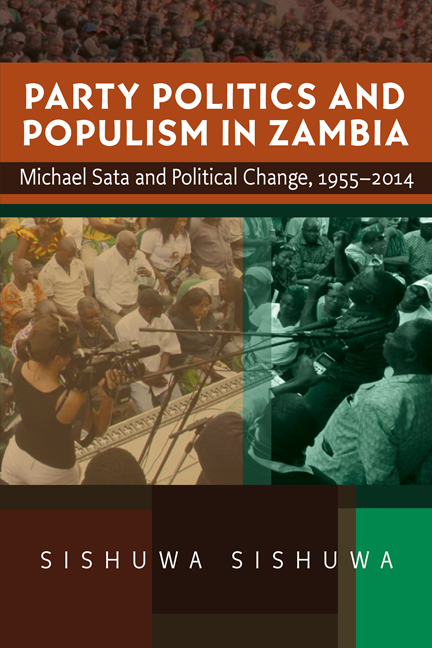Book contents
- Frontmatter
- Dedication
- Contents
- List of illustrations
- Preface
- List of abbreviations
- Map
- Introduction
- 1 Becoming Bemba and a ‘Man of Action’
- 2 Mobilising Urbanites in the One-party State
- 3 Constructing a Power Base in a Dominant Ruling Party
- 4 Building an Alternative Political Force
- 5 Winning the Prize
- Conclusion
- Bibliography
- Index
2 - Mobilising Urbanites in the One-party State
Published online by Cambridge University Press: 09 May 2024
- Frontmatter
- Dedication
- Contents
- List of illustrations
- Preface
- List of abbreviations
- Map
- Introduction
- 1 Becoming Bemba and a ‘Man of Action’
- 2 Mobilising Urbanites in the One-party State
- 3 Constructing a Power Base in a Dominant Ruling Party
- 4 Building an Alternative Political Force
- 5 Winning the Prize
- Conclusion
- Bibliography
- Index
Summary
THE PRE-EMINENT political force in Zambian society from independence in 1964 to 1991 was the United National Independence Party (UNIP) led by its founder, President Kenneth Kaunda. UNIP's dominance of national politics was first highlighted in two competitive multi-party elections: one at the close of the colonial period in January 1964 when the party won an outright majority, and the other in 1968 when it increased its support across the country. UNIP consolidated its political hegemony in December 1972 when Kaunda declared Zambia a one-party state. This declaration ushered in a second and longer phase of UNIP's formal grip on power that ended only in 1991 when a popular uprising, spearheaded by a newly formed opposition party named the Movement for Multiparty Democracy (MMD), saw the reintroduction of multi-party politics and the subsequent defeat of Kaunda and his nationalist movement.
It should not be assumed that the one-party state was monolithic. General elections, which were competitive especially at parliamentary level, were held in 1973, 1978, 1983, and 1988. The first two of these have been the subject of detailed research by scholars of Zambian political history. The latter two, in contrast, have not, and are important because they took place after UNIP removed the unpopular restriction that had previously limited the number of candidates who could run for election to the National Assembly to three per constituency. In instances where there were more than three prospective candidates in a constituency, primary elections were held to determine the finalists. Although prospective candidates still had to apply to the party's Central Committee for adoption, the abolition of the primary elections paved the way for greater voter choice and more open electoral contests. Studying electoral contests in this greatly altered political environment can yield significant insights into our understanding of the workings of one-party participatory democracy.
Moreover, the 1983 and 1988 elections are of particular interest to this chapter because they occurred after Sata, who went on to become one of the key political actors in the one-party state until its demise, made his formal entry into Zambian mainstream politics in 1981. He ran for parliamentary office in both elections, defeating nine other contestants including an incumbent Member of Parliament (MP) in the first election before being re-elected five years later.
- Type
- Chapter
- Information
- Party Politics and Populism in ZambiaMichael Sata and Political Change, 1955 - 2014, pp. 67 - 92Publisher: Boydell & BrewerPrint publication year: 2024

